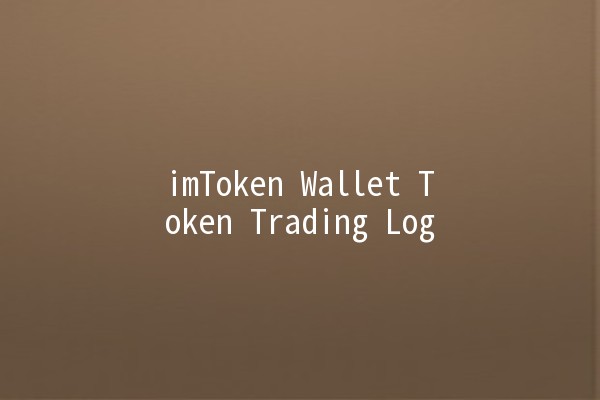In recent years, cryptocurrency has become a cornerstone of the modern financial landscape. As digital currencies continue to evolve, the tools for managing them also advance. One such tool is the imToken wallet. Launched in 2016, imToken is a wallet that allows users to manage various cryptocurrencies and tokens easily. It supports a wide range of ERC20 tokens, which makes it suitable for those who are actively investing in and trading digital assets.
One crucial feature of the imToken wallet is its ability to log trading activities. This token trading log is essential for users as they aim to keep track of their transactions and performance. In this article, we will delve into the significance of the trading log feature in imToken, provide productive tips for managing token trading logs, and enhance your overall trading experience.
Token trading logs serve multiple purposes, every trader should understand their importance:

Below are five productivity enhancement tips to help you manage your token trading log more efficiently:
Explanation: Consistent entry of transactions into your trading log directly after each trade creates a reliable record.
RealWorld Example: Suppose you just executed a trade for a new altcoin. Immediately logging the quantity bought, purchase price, and transaction ID ensures that you don't forget important details later. This consistency builds a comprehensive historical record, making it easier to analyze trades over time.
Explanation: Categorizing transactions boosts the efficiency of navigation and analysis.
RealWorld Example: You might categorize trades by token type, strategy employed (e.g., shortterm, longterm), and profit/loss. If you want to evaluate your longterm strategies for Ethereum versus a newly acquired meme token, you can filter and assess only those trades, facilitating better decisionmaking.
Explanation: By developing your own performance metrics, you can enhance your insights into trading results.
RealWorld Example: Create benchmarks such as "Return on Investment (ROI)" or "Win Rate" for tracking. For instance, if you invested $1000 in various tokens and made a total return of $1500, your ROI would be 50%. Monitoring these metrics across time helps check the efficacy of trading strategies.
Explanation: Set aside time for regular reviews of trading logs to identify patterns or make necessary adjustments.
RealWorld Example: If, after reviewing the last two months, you realize that most gains came from trading a particular token at certain price levels, you can adjust your buying strategy moving forward. For example, if Bitcoin consistently exhibits gains after a particular market cap is reached, you can set alerts to buy during similar instances in the future.
Explanation: Leveraging dedicated software tools can streamline the tracking process.
RealWorld Example: Use thirdparty platforms or tools to automate the logging process. For example, integrating your imToken wallet with tools like CoinTracking or CryptoCompare can save time and prevent errors. This integration allows transactions to sync and populate your trading log automatically, providing an uptodate view of your trading history without manual input.
Accessing your trading logs in imToken is straightforward. Open the imToken app, navigate to the "Assets" section, and find your transaction history. Each transaction is typically detailed, providing all necessary information, such as date, amount, price, and type of transaction (buy/sell). You can sort these entries for better visibility.
Yes, exporting your trading logs is possible. You can take screenshots of your transaction history or export them into a CSV file from certain interfaces within the app. This feature is useful for tax reporting or conducting a more extensive analysis of your trading history.
Your trading log should ideally include the following information for each transaction:
Date and time of the transaction
Token name and symbol
Quantity traded
Purchase/Sale price
Total value of the transaction
Fees incurred
Wallet addresses involved
Consistency in these elements will help maintain comprehensive records for performance evaluation.
Absolutely! Tracking emotional responses can be more important than the trades themselves. Documenting how you felt before, during, and after trades can highlight emotional biases. This reflection aids in enhancing decisionmaking and maintaining discipline in your trading routines.
Your trading log acts as a feedback mechanism. By reviewing past trades, you can identify:
What strategies worked and which did not
Patterns in successful trades (like time of day or market conditions)
Areas for improvement (like emotional decisionmaking)
This information allows for better strategy formulation and foresight.
Yes, several tools are compatible with imToken that can facilitate trade logging, including:
CoinTracking: A tool that can automatically import trades from various wallets, including imToken, to track performance efficiently.
Blockfolio: While not specifically a trading log tool, it can help you manage and track your portfolio value, linking to your trading history.
Leveraging such applications can significantly enhance your trading log experience.
In summary, as cryptocurrency continues to proliferate, maintaining an effective trading log within your imToken wallet becomes paramount. Not only does it help with compliance and performance evaluation, but it also serves as a strategic tool to inform future trading decisions and enhance overall trading efficiency. By implementing the suggested productivity tips and utilizing available features, you can maximize your trading potential within the imToken ecosystem. Happy trading!